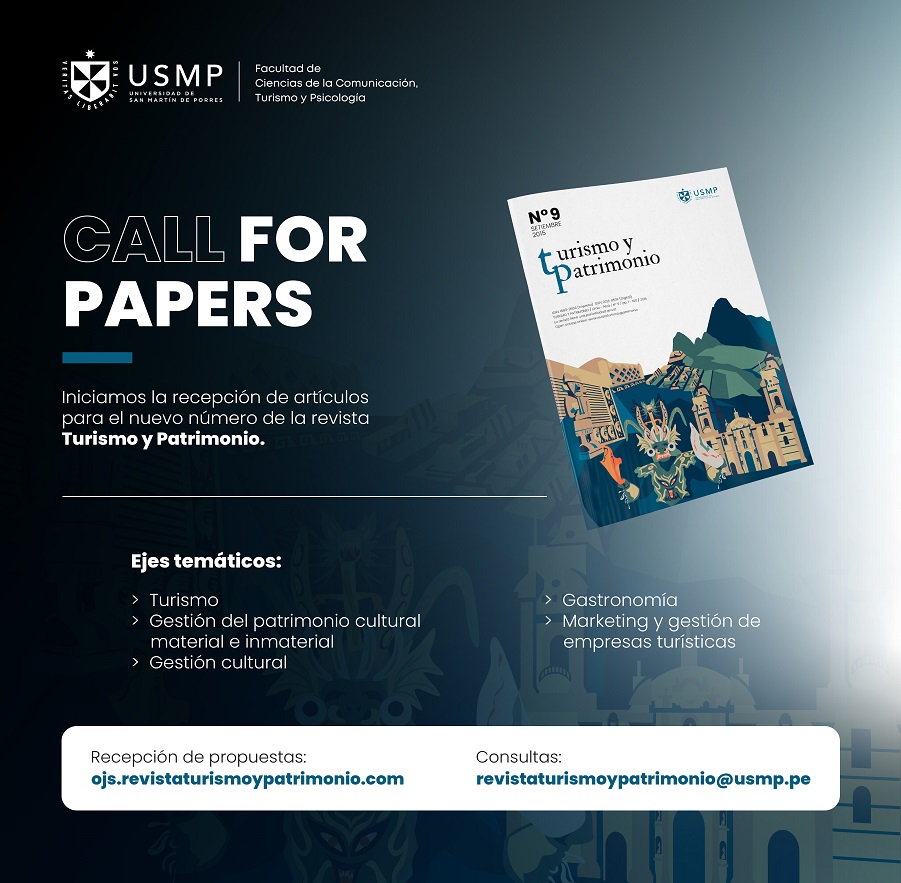Turismo sostenible a través de innovaciones de economía social
Resumen
Esta nota de investigación presenta los principios que definen el campo de la economía social y discute las características de las organizaciones que lo conforman. Teniendo en cuenta la definición y delimitación de este campo, discutimos la pertinencia y el rol de las organizaciones de economía social en el ámbito del turismo.
Descargas
Citas
Arellano, A. (2011). Tourism in poor regions and social inclusion: The porters of the Inca Trail to Machu Picchu. World Leisure Journal, 53(2), 104-118.
Baptista, E. & Bartholo, R. (2010). Les entreprises sociales de base communautaire, nouveaux protagonistes pour un autre développement. Une étude sur quelques groupes productifs dans le contexte Brésilien. Innovations, 3(33), 203-224.
Bouchard, M. (2010). The evaluation of the social economy in Quebec: With regard to stakeholders, mission and organizational identity. En M. Bouchard (Dir.). The Worth of the Social Economy: An International Perspective (pp. 11-132). Bruselas: CIRIEC y Peter Lang.
Bouchard, M. (2011). Introduction. L’innovation sociale en économie sociale. En M. Bouchard (Dir.). L’économie sociale. Vecteur d’ innovation. L’expérience du Québec (pp. 1-20). Québec: Presses de l’Université du Québec.
Bouchard, M. (2012). Social innovation, an analytical grid for understanding the social economy: the example of the Quebec housingsector. Service Business,6(1),47-59.
Bouchard, M. (Ed.) (2013). Innovation and the Social Economy: The Quebec Experience. Toronto: University of Toronto Press.
Defourny, J. & Nyssens, M. (2010). Conceptions of social enterprise and social entrepreneurship in Europe and the United States: Convergences and divergences. Journal of Social Entrepreneurship, 1(1), 32-53.
Demoustier, D. & Richez-Battesti, N. (2010). Les organisations de l’économie sociale et solidaire: gouvernance régulation et territoire. Géographie Économie Société, 12(1), 5-14.
Desforges, J. G. (1980). Stratégie et structure des coopératives. Revue du CIRIEC, número especial: Stratégies et développement des coopératives,12(1), 32-58.
Evers, A. & Laville, J. L. (2004). Defining the third sector in Europe. En A. Evers & J. L. Laville (Eds.). The third sector in Europe.Northampton: Edward Elgar Publishing.
Huaita, A. M. (2012). Ecoturismo y desarrollo humano. El caso de una asociación privada con la comunidad de Infierno. Turismo y Patrimonio, 7, 24-31.
Kerlin, J. A. (2006). Social enterprise in the United States and Europe: Understanding and learning from the differences. Voluntas:International Journal of Voluntary and Nonprofit Organizations, 17(3), 246-262.
Klein, J. L., Fontan, J. M, Harrisson, D. & Lévesque, B. (2012). The Quebec system of social innovation: a focused analysis on the local development field. Finisterra. Revista Portuguesa de Geografia, XLVII(94),9-28.
Lane, M. D. & Casile, M. (2011). Angels on the head of a pin: The SAC framework for performance measurement in social entrepreneurship ventures. Social Enterprise Journal, 7(3), 238-258.
Laville, J. L. (Ed.) (1994). L’économie solidaire. Une perspective internationale. Paris, Desclée de Brouwer, 1994. Légaut, G. (2013). L’UCPA, entreprise associative sociale et solidaire. ESPACES Tourisme et Loisir, 310, 111-114.
Lévesque, B. (2013). How Social Economy Won Recognition in Québec at the End of the Twentieth Century. En M. Bouchard.Innovation and Social Economy. Toronto: University of Toronto Press.
Mertens, S. (Ed.). (2010). La gestion des entreprises sociales. Lieja, Bélgica: EdiPro.
Nyseens, M. (Dir.). (2006). Social enterprise. London: Routledge.
Pérez, B. (2012). Retóricas de turismo y desarrollo en los Andes. La red de turismo rural comunitario Pacha Paqareq, Perú. En R. Asencio &B. Pérez (Eds.). ¿El turismo es cosa de pobres? Patrimonio cultural, pueblos indígenas y nuevas formas de turismo en América Latina. Colección Pasos Edita Nº 8. IEP. Recuperado de http://www.pasosonline.org/Publicados/pasosoedita/PSEdita8.pdf
Pozzebon, M., Tello Rozas, S. & Delgado, N. (2013). The use and consequences of participatory GIS in a Mexican municipality:Applying a multilevel framework. RAE. Revista de Administração de Empresas - Journal of Business Administration (en prensa).
Quarter, J., Mook, L. & Armstrong, A. (2009). Understanding the Social Economy: A Canadian Perspective. Toronto: University ofToronto Press.Richez-Battesti, N. & Oswald, P. (2013). Les principes de l’économie sociale et solidaire au cœur de la stratégie des Villages Clubs du soleil. ESPACES Tourisme et Loisir, 310, 99-110.
RISQ (2008). Guide d’analyse des entreprises d’économie sociale. Québec: Réseau d’Investissement Social du Québec.
Rousselière, D. & Bouchard, M. (2011). À propos de l’hétérogénéité des formes organisationnelles de l’économie sociale:isomorphisme versus écologie des organisations en économie sociale. Canadian Review of Sociology. Revue Canadienne de Sociologie, 48(4), 415-453.
Salamon, L. M. (1996). The Emerging Nonprofit Sector: An Overview. New York: Manchester University Press.
Tello, S. & Gauthier, B. (2012). Les tontines favorisent-elles la performance des entreprises au Cameroun? Revue d’Économie du Développement, 26(1), 5-39.
Tello, S. & Paredes, J. C. (2002). Turismo, pobreza y desarrollo. Una propuesta de análisis para América Latina. Alcuth, 1, 29-51.
Vaillancourt, Y. (2006). Le tiers secteur au Canada, un lieu de rencontre entre la tradition américaine et la tradition européenne. Canadian Review of Social Policy. Revue Canadienne de Politique Sociale, 56, 23-39.Vásquez, E. (2012). El Perú de los pobres no visibles para el Estado: La inclusión social pendiente a julio del 2012. Documento de discusión DD/12/04. Lima: Centro de Investigación de la Universidad del Pacífico.
Verdera, F. (2007). La pobreza en el Perú. Un análisis de sus causas y de las políticas para enfrentarla. Lima, Instituto de Estudios Peruanos.
Viannay, C. (2013). VVF Village, entreprise d’économie sociale et solidaire. ESPACES Tourisme et Loisir, 310, 115-117.
Vienney, C. (1980). Rapports d’activités et rapports de sociétariat. En J. G. Desforges & C. Vienney (Dir.). Stratégie et organisation de l’entreprise coopérative (pp. 251-286). Montreal: Éditions du Jour.
Vienney, C. (1994). L’économie sociale. Paris: La Découverte.
Weisbrod, B. (1988). The nonprofit economy. Cambridge: Harvard University Press.
En caso de que el manuscrito sea aprobado para su publicación, los autores/as conservan los derechos de autor y ceden a la revista el derecho de la publicación, edición, reproducción, distribución, exhibición y comunicación tanto en el país de origen como en el extranjero, mediante medios impresos y electrónicos en diferentes bases de datos. Por lo tanto, se establece que después de la publicación de los artículos, los autores/as pueden realizar otros acuerdos independientes o adicionales para la difusión no exclusiva de la versión del artículo publicado en la presente revista (por ejemplo, en libros o repositorios institucionales), siempre que se indique explícitamente que el trabajo fue publicado por primera vez en Turismo y Patrimonio.






















.jpg)





 Los artículos publicados se encuentran disponibles en acceso abierto bajo la licencia
Los artículos publicados se encuentran disponibles en acceso abierto bajo la licencia 
